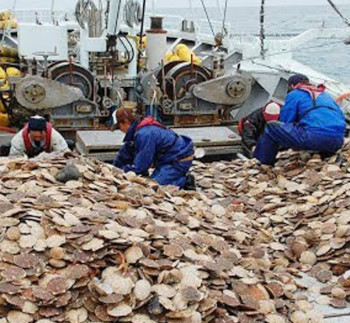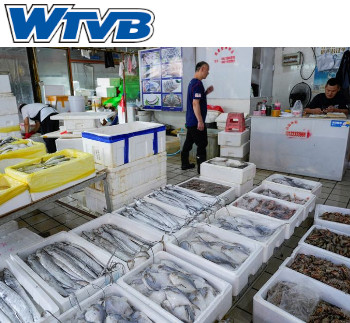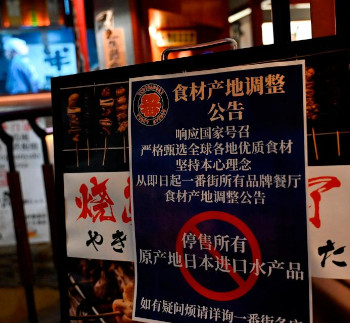|

Image: The Asahi Shimbun / Housen / FIS
Companies seek new market for scallops after China ban
 JAPAN
JAPAN
Tuesday, September 26, 2023, 07:00 (GMT + 9)
Seafood suppliers are struggling to get their products to market after China banned Japanese seafood imports in response to the discharge of treated radioactive water from the crippled Fukushima No. 1 nuclear power plant.
Since the ban was announced on Aug. 24, Gen Komori, president of Tokyo-based seafood trading house Housen Co., has received inquiries for scallops from overseas but at "incredibly low prices."

Source: Housen
“I feel like (Japanese businesses) are getting ripped off,” said Komori.
According to a survey by the Fisheries Agency, prices of scallops in Hokkaido and three other prefectures have plunged 11 to 27 percent since China imposed its ban.

At Marui Sato Kaisan Co., a seafood processing company based in Betsukai, Hokkaido, inventories of frozen scallop abductor muscles have piled up since orders from China, a major export market, evaporated in July even before the ban was implemented.
“I am worried about where things go from here,” said Takeshi Ise, the company president.
China is the largest overseas market for Japanese seafood, followed by Hong Kong.
Last year, Japan exported seafood worth 83.6 billion yen ($562.9 million) to China. Scallops accounted for 48.9 billion yen, followed by sea cucumbers at 9.8 billion yen.
The impact of the Chinese ban is not limited to domestic businesses.
An estimated 30,000 to 40,000 tons of shell-on scallops were exported to China, processed there and then shipped to the United States annually.

American and European buyers have said it will become difficult to supply products to North America unless Japanese scallops can be brought into China.
<-- Photo: The Asahi Shimbun
Komori said he plans to explore the possibilities of exporting Japanese scallops to other countries where they can be processed for North America and Europe as well as developing new distribution channels in Japan.
“We need to support fishermen in sales so that they will not become dispirited by excessive price declines,” Komori said.
The United States has its own safety and health standards for imported processed food.
The U.S. Embassy in Japan is introducing processing facilities in Taiwan, Thailand, Vietnam and other countries that meet the U.S. standards so that Japanese fisheries businesses can export scallops to the United States from those facilities.
The government plans to help Japanese businesses if they choose to process scallops on their own by subsidizing two-thirds of expenses to introduce equipment for shelling scallops.
Nikko Co., a food machinery maker based in Kushiro, Hokkaido, manufactures equipment for automatically removing abductor muscles from shell-on scallops.
“Processing facilities in Hokkaido are chronically short of hands and rely on foreign technical interns,” said the president of a seafood processing company in Hokkaido. “They cannot easily increase the number of workers or raise hourly wages.”
Authors: Hideki Motoyama, Tomoyuki Yamamoto, Hironori Kato | The Asahi Shimbun

Related News:




.png)
.png)
[email protected]
www.seafood.media
|



